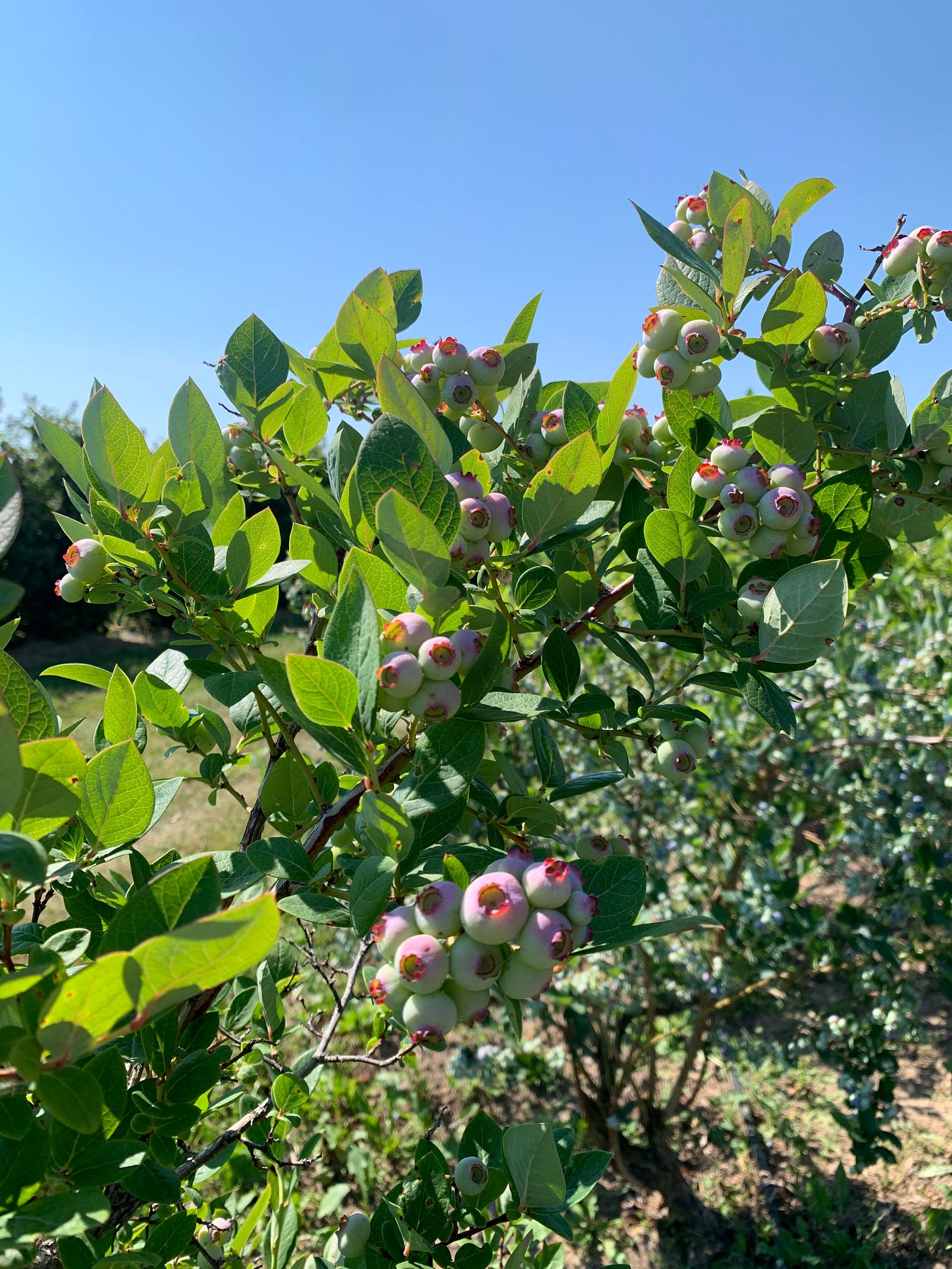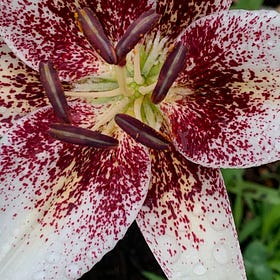Summer workshops are here — revive your creative life with workshops to find creative flow in Chicago. Learn more and sign up here. To start, strengthen, or sustain a creative, contemplative practice, schedule a virtual 1:1 session. As always, listen to these essays in podcast form here, share with a friend, upgrade, or pair your creative practice with a journal from Odette Press.
“Ecclesiastical writers on the subject point out that in the beginning there was water, all life proceeded from water, there was water in Eden, water when we fell, then the slate got cleaned with it. Water breaks, and out we come. The point, as far as I can tell, is that water has been at it, oblivious to our observations, for longer than we know.”
— Tamar Adler, An Everlasting Meal: Cooking with Economy and Grace
In the middle of July’s morning, we flow into the field dotted with fruit like budding stars. What starts as an orb of chartreuse turns to pink, then into myriad teals, deepening into the blooms of blues as days and drops of water grow each berry incrementally. Standing in the orchard, we marvel and meditate on each fruit inhaling to full sweetness, until the skin shrivels and decays, or else falls to the ground, if not picked, eaten, and enjoyed in the Summer season.
Sage green leaves gather around clumps of the growing blueberries. Cells gather together to create sugar, seed, juice, pulling nutrients up from the root. I wade into the thick of July heat on Saturday morning on a mission to find and bring back to the city. To pick them each, and preserve. All around are the sounds of false securities: hawks’ and crows’ calls, amplified on loops through speakers, repeating.
Blueberries speak the song of July, and each fruit will tell you their story in the deep, rich blue of their skin, signaling their readiness, steady from the sunlight, the nutrients of soil, and the thousands of drops of water or rain it takes, met with each repeating night and day, until each plant receives what it needs to turn to fruit. Drops of rain, water, days, I hear the rhythm of berries as they fall in the pail. Reaching, watching, breathing; standing, picking, squatting down; fruit and dirt accumulate at my fingertips. Picked by the handful, each round fruit plays the drum of retrieval, gathered drop by drop and drop into the bucket.
Plant, person; being, berry — each of us need many of the same things: food, sunlight, balance, earth, sunlight, fire, time, rest, night, tending. I gather my breath and lose my lines of thinking while picking. I am me, but not thinking about who I am or the accumulations of my stories; I am in the moment, gathering, instead, accumulations of fruit with the intention of preserving them, baking them, cooking them down, upon arrival back in the city.
In what I can pull from my stores of memory, it was my mother’s mother whose practices of canning first stirred my earliest memories of jams and preserving — the first person I can recall who made her own jam, who would celebrate her birthday by bright, sweet season as the earth turned toward her each July. Pounds and pounds picked, each, of tomatoes, blackberries, peaches, strawberries. Each crop marked the arrival to the fruiting heat and thick of the Summer season, and her practice of picking, and therefore her celebration. My grandmother was humble, as were many working women, now and throughout my her duration of time, preserved by strength, care, a pinch of stoicism, and endurance, as a jar comes to guard the syrup and fruit contained within.
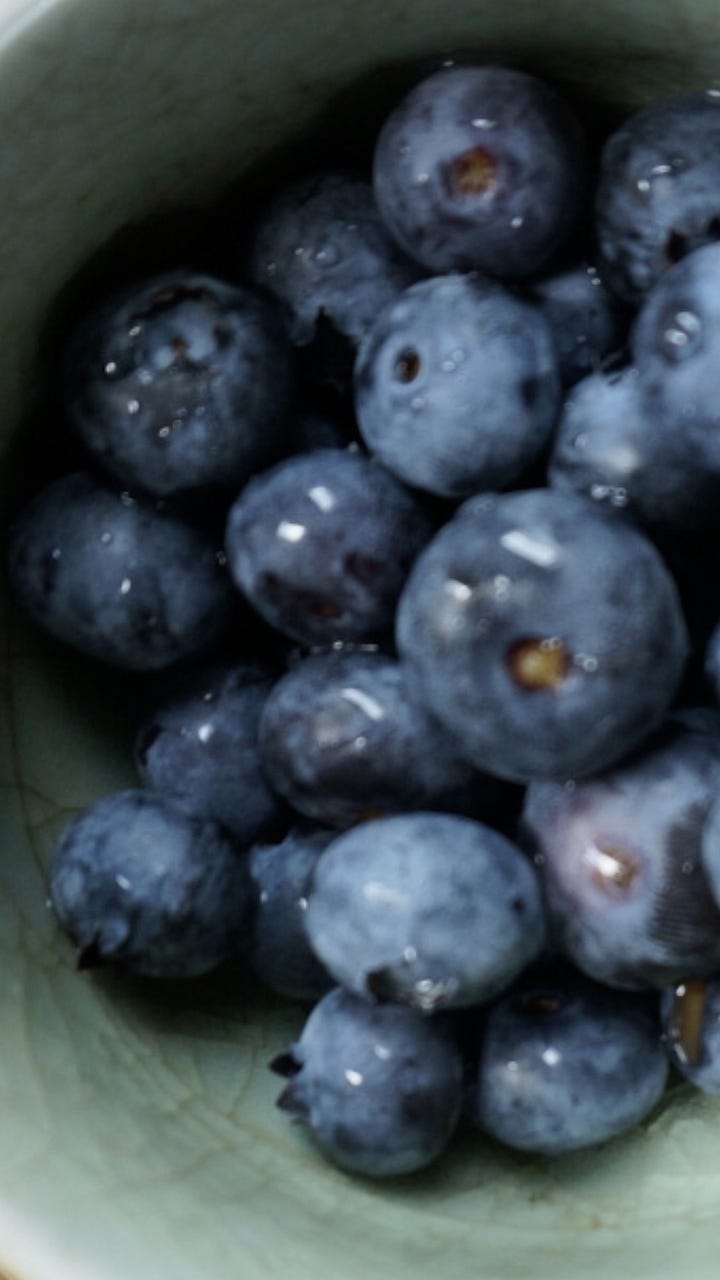
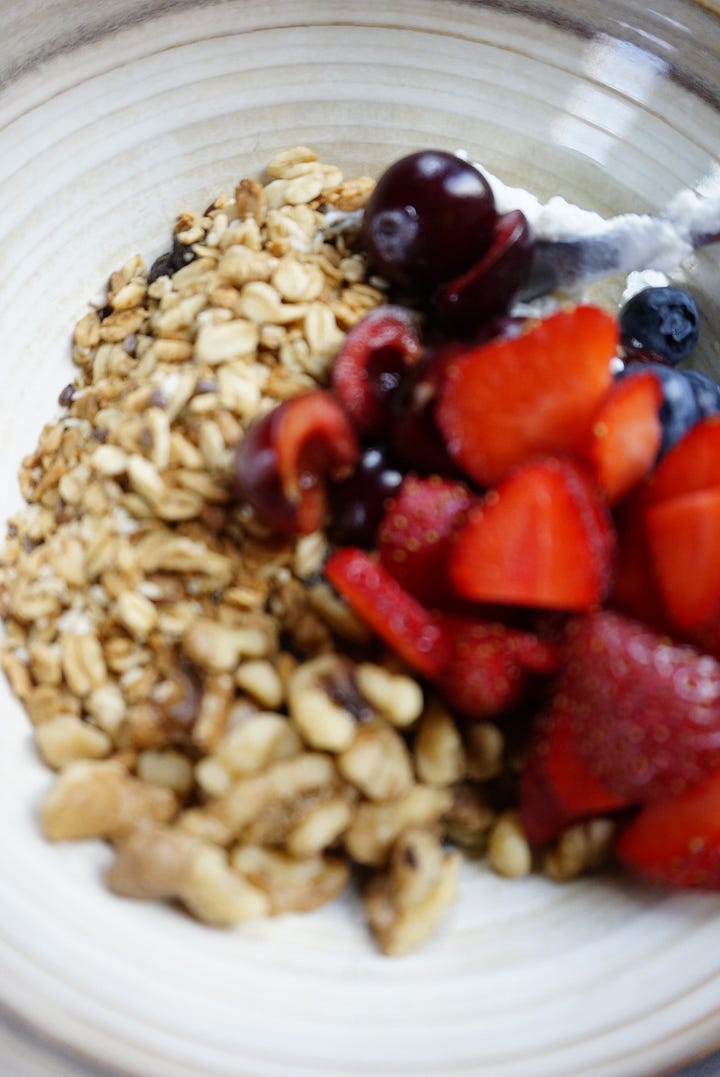
To preserve, to revere, to pick, to plenty: my mother’s mother was a simple woman, yet her efforts yielded — as I find in my own picking, and my own practice of meditation — a sense of devotion. Miracle, like breath or berry, forms through learning to both perceive and provide, to patient and persevere despite the pressures, to make way for generosity through the act of preserving. Throughout the Summer, my grandmother would take tomatoes, compress them down through a ricer, then suspend them across time in the confines of her pressure cooker, or she take those pounds of precious strawberries, cook them to jam, then keep them until the time was ripe for sharing, stored in the freezer.
There is a diligence in berry picking, as we find and turn toward in meditation. This diligence veers you away from the grips of focus and surrenders you, instead, into the act of flow — the same state of existence I find later, having said goodbye to the field and Saturday’s sun, standing over the stove cooking down strawberries for my own jam. Picking fruit, like watching your thinking, and following your breathing, wells up a sense of patience over time; that patience builds up — as with both breath and berry — so steadily, over time, the bucket fills. Later, that Saturday evening, in reverence to her story and season, in delight of the full ripe red fruit, I clicked on the stove, poured equal parts sugar into a pan with water, then began the process of heating the mixture, staring intently into the basin of the belly of the saucepan until the mixture stilled, then browned, then came to boil. Thick, steady, sweet.
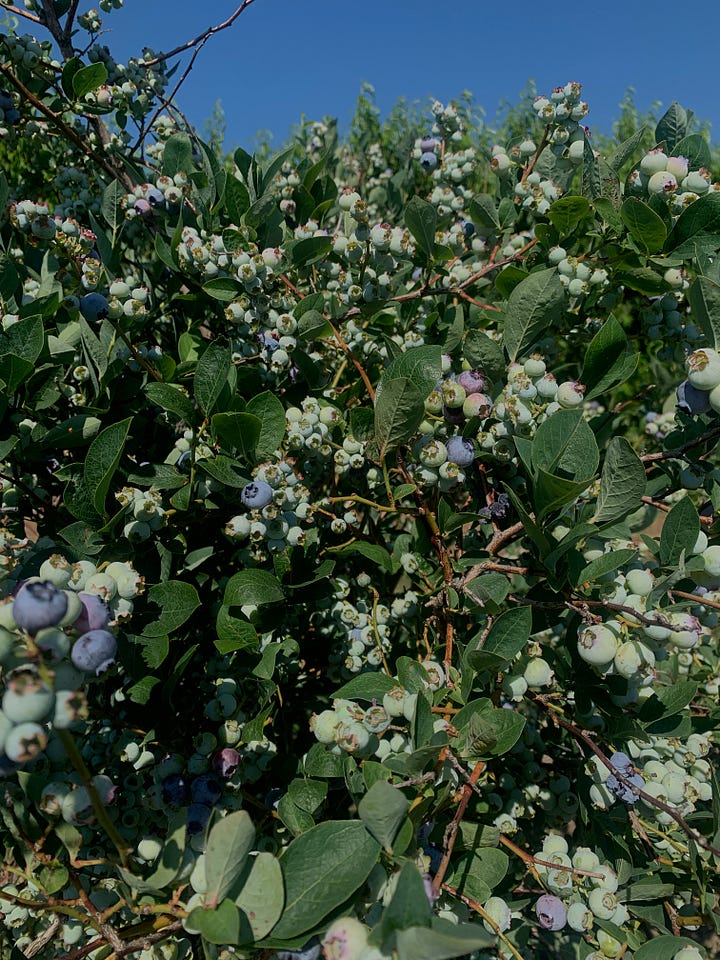
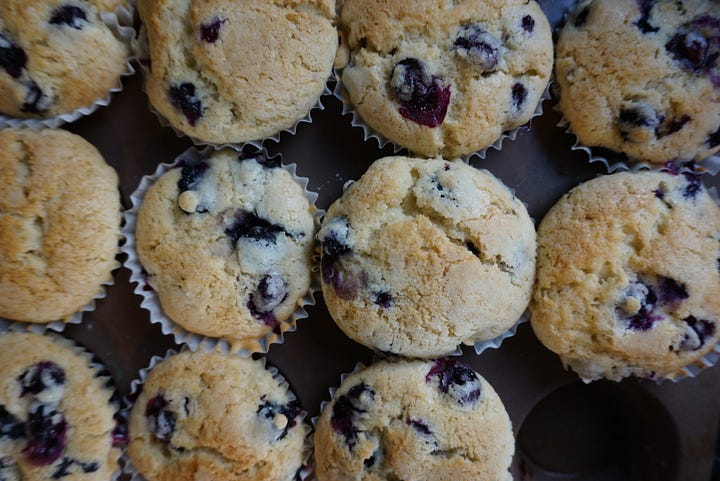
We’d inspected each berry, marveling at its richness. The berries are thick with ripeness, and sweet, and bursting with Summer and flavor, and as they should be: tiny, precious, and red, all the way through. Recipe are instructions for continuity: they reach us into the past, and bring us into the future, and we make them with the full ripeness of berry and our attention and sensing.
Water, sugar, fruit, heat time is all it takes to preserve some of the strawberries into their condensed, jammed form, and I think about the elements of seasons, and times, and the repetitions we turn to; how it is often this economy, this grace, this persistence, this simplicity, that makes something sustainable. A breath exhales; a berry drops in a bucket; a hundred thousand drops of water gather up and pool to form fruit from root; a root takes form and forms a practice; we endure, for the decades we’re given; a lineage endures for thousands of years, spanning centuries.
Though my first instances of preservation came from my mother’s mother, I don’t have her recipe; instead, I follow the steps for strawberry jam from Mother Grains. i have cooked this three other times, each with a reverence and deep sense of care. The flavor of the fruit is thicker, denser in color and flavor, and more pronounced than my grandmothers; I yield one jar, to be spooned over yogurt and into dessert for the week, rather than her jars of many, yet the process still feels reverential. I follow the recipe and my instincts. Stirring and stirring, the process asks for time, while in the days to come ripe fruit will leave their marks as if bright washes of color across the plate.
There are certain ingredients to the process of picking, cooking, and meditation that we bring into the process of preservation. First, there is a basic care: I care about this breath, this body, this fruit, enough that I seek to sustain it. Then, there is the ways we tend to fruit, to seat, to plate. To the extent that we follow a recipe or practice, we acknowledge that there may be errant moments, or errors — and so each brings with it a level of surrender, of letting go, and entering into the flow of life that cooking brings to mind, body, and form. I understand the inhale and exhale, both fruit and breath’s rise and decay, and therefore learn to savor each: the temporal aspects of fruit, cooking, eating, savoring, and breathing with the seasons.
Picking berries, tomatoes, and later, peaches, was a ground, a practice, and a space for my grandmother to enter into life and being with herself outside of time: a time to meditate, and be with the soil, where her only immersion was one in dialogue with her hands, her time, her rhythm, and the earth. My grandmother poured into life, and as many women of her time and across time. Our definitions of faith and practice divergent, I still learned, from her instruction, a kind of kindness, dedication, and giving. Cooking, an often wordless thread that connected us, became a convergence across lineages: a devotion the same whether the flavor was that of Catholic scripture or Buddhist sutra. Taking Summer’s tomatoes and strawberries, she’d line jars across her kitchen and share them throughout the seasons, then breathe into them the ingredients of time, and new life. There was always some effort made to make things sweet, and she effused care into the world with an economy that yielded a practice of patience, endurance, and a generosity enough to share.
My grandmother’s process — picking and canning, cooking and preserving, then canning to share — was a way of preserving and returning to the core of herself. To enter into closeness with the earth and find a rhythm of the quietness of the farms and fields, then to immerse herself into the heat of the season and take that which had grown, and create something. I asked my mother to share what she remembered. “Being close to nature” was, for my grandmother “relaxing and calming,” she shared. On Saturday, I found I could think of nothing else, for that time, but the prayer of picking, the joy of being present with the ever-growing fruit.
The acts of berry picking and cooking, like meditating, encourage a flow state: one where the stories I weave together about being an I dissolve. An insight forms, and sparks as if fruit forming, firework, firefly, or all; it occurs to me that when I am picking berries, cooking, meditating, or writing, when I dissolve thinking into the flow of being, I am often more in my body, and less thinking about who I am. I cease to think of myself at the intersection and convergence of all of my stories, at least for a time, being with breath, berries as they release from the branch, the water filling, the sugar cooking, watching the fruit grow, to let the fruit sing their fullest forms over heat, water, and time. A larger state of collaboration, a felt sense of understanding and presence. And yet — as is the nature of paradox, each July, I think of my grandmother, her process, presence, and endurance, connecting with the lines of women I come from: all their persistence and years of work, and all the work it takes to labor, to mother, to mind, to care, to heart, to tend, to continue.
A kitchen is a site of convergence: a symphony of presence, a place we come back to for the acts of sustaining and repeating. We bring ourselves into full presence, lest we tempt ourselves to burn a precious vegetable, or forget a pile of fruit or bread from lack of attentiveness. Reverence is the seed for presence, and the berries each matter to me, and so I cover them in the ritual of memory — of sugar, water, and time — to make matter, the maternal, to memory. Water and fire are the first things we turn to to transform matter into something easier to digest; our connections with earth and each other, along with our connections to land, plant, water, and fire, ensured our nourishment, our preservation, our survival and what I learn that is preserved in the embodiment and memory of my grandmothers — both sides of my family, frankly, equally — is that there is a richness in simplicity.
On the economy of effort, and the nature of cooking with water, Tamar Adler writes:
“There is a prevailing theory that we need to know much more than we do in order to feed ourselves well. It isn’t true. Most of us already have water, a pot to put it in, and a way to light a fire. This gives us boiling water, in which we can do more good cooking than we know.”
I often find deep delight and satisfaction in watching and witnessing a transformation: a berry growing from budding into the full ripeness of its form, seeing it later in a decaying state, pulling our attention toward the ephemeral and beautiful in life. Yet to preserve something is to take the fruit, as in practice, as in memory, and impart it with some kind of endurance: to suspend it in sugar, and carry it out across time. To learn to preserve is to take the ingredient of awareness, time, and equal parts thinking to the future. To preserve is to pour into future in the present tense, to take time to pour into a legacy of endurance. Picking through fruit, like noticing breath, is a practice of presence: an endurance built in slowness and steadiness; and how both are ways to sutra, of stitching ourselves closer with ourselves and our experiences.
Stirring strawberries that Saturday night, I thought about the lineages we preserve, and the practices that draw up nourishment from the root. I consider the language of heat and water — how they cleanse and clear, or with time and effort, transform matter into something new, different. Preservation is what we do when we make jams, pickles, extending the life of vegetables, that which is made to nourish, or the bounty of fruit, and rituals strike a chord, or else suspend that which is fruitful, and sustain it as song or taste across time. Preservation is to suspend something in time; to play with reverence and resource, to understand the temporal, ephemeral — and rituals, like picking fruit from the trees, bring me closer to my ancestors and my lineages.
I think about the recipes I know not by measure, but by how I feel when I do them, picking blueberries off the bushes, then taking them back, sorting through the fruit in the dim light of the kitchen.
Time, heat, and cooling are all elements we tend to in preserving, and sometimes the language of food is one we carry with us, one that stops us, drops us down, and pulls us out of time as something linear. Breath and eating happen in the present tense, while recipes reach us back into the past, and food sustains us with promises of continuity. In the year after my grandmother’s passing, clearing out my grandmother’s home, my family found jars and jars of her canned tomatoes in cabinets; while jars of her bright red strawberry jam sat suspended in sugar and time tucked away in the freezer. That recipes, rituals, and routines at once reaching back into memory while nourishing ourselves in the future; that these acts of repetition stay with us long after our breath is gone. Time, instead of a thread or a line, blossoms into berry, or forms in all directions, and we flourish in dimension.
What do we choose to stay with, to preserve; to keep, to hold, or else to hold sharp knife against —- as in the bruises, old stories, or delusions we choose to cut away? What do we condense down, refine to full form, or choose to preserve across generations? What do we pick, pluck, in patience, and for endurance, or preservation? Looking to the kitchens and practice of my life I learn to watch closely, as is the case with sugar boiling in the pan; to pay attention to what I pour into; what I choose to cook, keep, and condense; what is preserved, and pour into with the same resolve, fierce care, and ferocity of the women who came before me. The fire is lit; the knives are sharpened; we cook, we fire, we transform, and we nourish each other together.
Nourished by, Nourishing:
Revisiting the chapters on ‘Apricots’ from Faraway Nearby by Rebecca Solnit, and The Book of Difficult Fruit by Kate Lebo. Watching the waves flow at Lake Michigan.
An overnight campsite just outside of the city.





